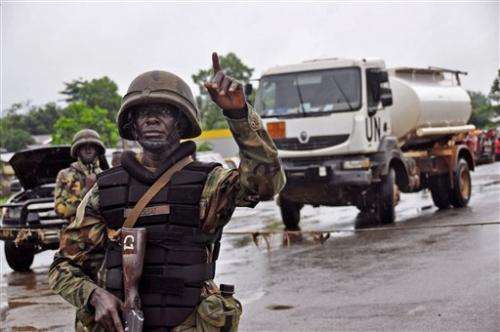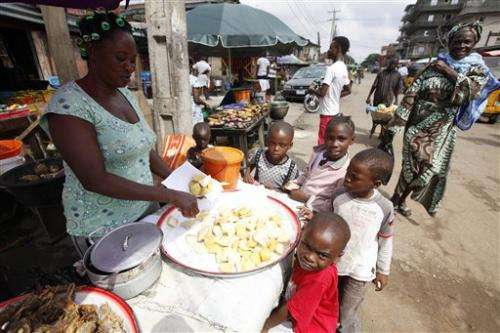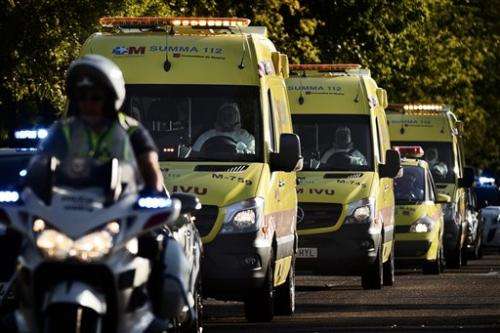Africans face long wait for unproven Ebola drug

Africans seeking a drug to help contain the Ebola virus will have to wait months before a potentially life-saving experimental treatment used on two infected Americans is produced even in small amounts, officials said.
And there are no guarantees that the medication known as ZMapp would help curb the spread of the dreaded disease, which starts with a fever and body aches and sometimes progresses to serious bleeding. Supplies of the drug are limited. It has never been tested for safety or effectiveness in humans.
The health minister of Nigeria, one of the four countries where Ebola has broken out, told a news conference in his country that he had asked the U.S. Centers for Disease Control and Prevention about access to the drug. A CDC spokesman said Wednesday "there are virtually no doses available."
Some people in other affected countries questioned why the medicine has not been offered to infected Africans.
Anthony Kamara, a 27-year-old man riding a bicycle in Freetown, Sierra Leone, said "Americans are very selfish. They only care about the lives of themselves and no one else."
He referred to ZMapp as "the miracle serum" that the U.S. has "refused to share with us to save African lives."
The lack of wider availability "shows simply that white patients and black patients do not have the same value in the eyes of world medicine," said Nouridine Sow, a sociology professor at the Universal Institute of Guinea.
But testing an unproven drug on a large population carries risks. Earlier this week, the CDC director emphasized that it's impossible to know whether ZMapp helped the sick American aid workers.
"Until we do a study, we don't know if it helps, if it hurts or if it doesn't make any difference," Tom Frieden told a health symposium in Kentucky.
The outbreak first emerged in Guinea and spread to neighboring Sierra Leone and Liberia before reaching Nigeria. Almost 1,000 people have died since March.
Some health experts fear that debate over extremely limited supplies of the drug will distract from more tried-and-true practices—identifying, isolating and aggressively treating the sick.
Dr. Anthony Fauci of the National Institutes of Health said the drug manufacturer has told the U.S. government that it would take two to three months to produce just "a modest amount."
"We don't even know if it works," he stressed.

Asked Wednesday about the experimental drug, President Barack Obama said all the information isn't in.
"We've got to let the science guide us," he said.
Underscoring desperate attempts to stop the disease, troops in full combat gear deployed in the rain to block people traveling to Liberia's capital from rural areas hit by Ebola. Liberian President Ellen Johnson Sirleaf declared a national state of emergency, and officials said Thursday that no one with a fever would be allowed in or out of the country.
In Sierra Leone, military forces also deployed as part of "Operation Octopus" which officials said was aimed at preventing "the unauthorized movement of Ebola-infected persons."
Liberia and Sierra Leone account for more than 60 percent of the deaths, according to the World Health Organization.
Liberian Information Minister Lewis Brown vowed that authorities would conduct stringent surveillance at the country's international airport, where many flights have been cancelled because of Ebola.
"We are facing a threat of the greatest proportion," Brown said. "Absolutely no one will be allowed to enter or leave our country with temperature above normal."
The unprecedented measures came after a man sick with Ebola in Liberia boarded a flight and ended up in Nigeria, Africa's most populous nation, where a nurse who treated him is now dead from the disease and several other people are infected. The traveler also died.
Ebola is spread only through direct contact with the bodily fluids of people showing symptoms.
Experts warned that extreme measures risk driving patients and their families further underground.
"Nothing replaces that sense of community trust. So if you come in with brute force, things might appear to be working, but it could be pushing people out where they can't control the borders and the disease gets out," said Dr. David Heymann, professor at London School of Hygiene and Tropical Medicine.

Sirleaf justified the 90-day state of emergency, saying the outbreak requires "extraordinary measures for the very survival of our state and for the protection of the lives of our people."
"Ignorance, poverty, as well as entrenched religious and cultural practices continue to exacerbate the spread of the disease, especially in the counties," Sirleaf said late Wednesday.
She warned that some civil liberties could be suspended. By Thursday, soldiers were already restricting movements on the roads to Monrovia, witnesses said. Some soldiers were deployed to the crossroads town of Klay, about 25 miles (40 kilometers) west of Monrovia in an effort to stop people from three Ebola-infected counties from coming closer to the capital.
The capital already has been hit by the virus, with bodies abandoned in the streets. Relatives are hiding feverish patients at home for fear if they are brought to isolation centers and don't have Ebola, they will end up contracting it anyway.
National Health Workers Association President Joseph Tamba said the state of emergency is necessary. But he says people should have been given advance notice to buy food ahead of the movement restrictions.
In Sierra Leone, President Ernest Bai Koroma mandated that all Ebola victims must now be buried near where they died to minimize exposure while transporting highly contagious corpses.
In other developments:
— A Spanish missionary infected by Ebola was in stable condition after being flown to Spain from Liberia, health officials in Madrid said. Miguel Pajares, 75, had been helping to treat people infected with Ebola and was one of three who tested positive at the San Jose de Monrovia Hospital in Liberia earlier this week.
— Zimbabwe President Robert Mugabe is considering withdrawing Zimbabwean soldiers, police and prison officers serving as U.N. peacekeepers in Liberia because of the Ebola outbreak, Zimbabwe's state-run Herald newspaper reported. "We must not expose ourselves unnecessarily," Mugabe was quoted as saying. Peacekeepers from dozens of countries were deployed in Liberia at the height of peacekeeping operations in a country that was riven by two civil wars. They are to remain until elections in 2017.
© 2014 The Associated Press. All rights reserved.


















